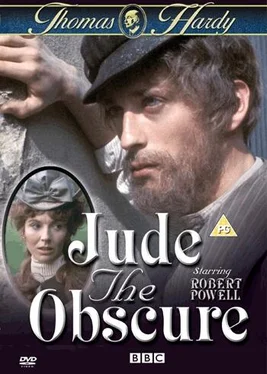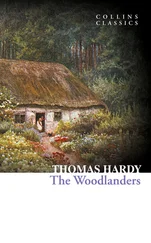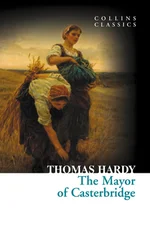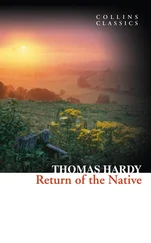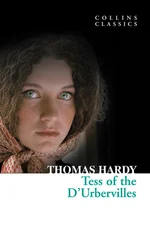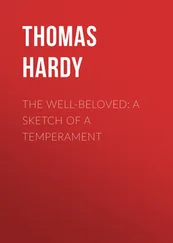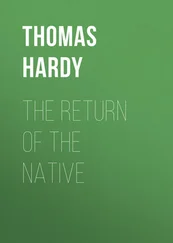Jude did not permit himself to speak, but turned and descended the stairs.
The man whom Sue, in her mental volte-face , was now regarding as her inseparable husband, lived still at Marygreen.
On the day before the tragedy of the children, Phillotson had seen both her and Jude as they stood in the rain at Christminster watching the procession to the theatre. But he had said nothing of it at the moment to his companion Gillingham, who, being an old friend, was staying with him at the village aforesaid, and had, indeed, suggested the day's trip to Christminster.
"What are you thinking of?" said Gillingham, as they went home. "The university degree you never obtained?"
"No, no," said Phillotson gruffly. "Of somebody I saw to-day." In a moment he added, "Susanna."
"I saw her, too."
"You said nothing."
"I didn't wish to draw your attention to her. But, as you did see her, you should have said: 'How d'ye do, my dear-that-was?'"
"Ah, well. I might have. But what do you think of this: I have good reason for supposing that she was innocent when I divorced her—that I was all wrong. Yes, indeed! Awkward, isn't it?"
"She has taken care to set you right since, anyhow, apparently."
"H'm. That's a cheap sneer. I ought to have waited, unquestionably."
At the end of the week, when Gillingham had gone back to his school near Shaston, Phillotson, as was his custom, went to Alfredston market; ruminating again on Arabella's intelligence as he walked down the long hill which he had known before Jude knew it, though his history had not beaten so intensely upon its incline. Arrived in the town he bought his usual weekly local paper; and when he had sat down in an inn to refresh himself for the five miles' walk back, he pulled the paper from his pocket and read awhile. The account of the "strange suicide of a stone-mason's children" met his eye.
Unimpassioned as he was, it impressed him painfully, and puzzled him not a little, for he could not understand the age of the elder child being what it was stated to be. However, there was no doubt that the newspaper report was in some way true.
"Their cup of sorrow is now full!" he said: and thought and thought of Sue, and what she had gained by leaving him.
Arabella having made her home at Alfredston, and the schoolmaster coming to market there every Saturday, it was not wonderful that in a few weeks they met again—the precise time being just alter her return from Christminster, where she had stayed much longer than she had at first intended, keeping an interested eye on Jude, though Jude had seen no more of her. Phillotson was on his way homeward when he encountered Arabella, and she was approaching the town.
"You like walking out this way, Mrs. Cartlett?" he said.
"I've just begun to again," she replied. "It is where I lived as maid and wife, and all the past things of my life that are interesting to my feelings are mixed up with this road. And they have been stirred up in me too, lately; for I've been visiting at Christminster. Yes; I've seen Jude."
"Ah! How do they bear their terrible affliction?"
"In a ve-ry strange way—ve-ry strange! She don't live with him any longer. I only heard of it as a certainty just before I left; though I had thought things were drifting that way from their manner when I called on them."
"Not live with her husband? Why, I should have thought 'twould have united them more."
"He's not her husband, after all. She has never really married him although they have passed as man and wife so long. And now, instead of this sad event making 'em hurry up, and get the thing done legally, she's took in a queer religious way, just as I was in my affliction at losing Cartlett, only hers is of a more 'sterical sort than mine. And she says, so I was told, that she's your wife in the eye of Heaven and the Church—yours only; and can't be anybody else's by any act of man."
"Ah—indeed? … Separated, have they!"
"You see, the eldest boy was mine—"
"Oh—yours!"
"Yes, poor little fellow—born in lawful wedlock, thank God. And perhaps she feels, over and above other things, that I ought to have been in her place. I can't say. However, as for me, I am soon off from here. I've got Father to look after now, and we can't live in such a hum-drum place as this. I hope soon to be in a bar again at Christminster, or some other big town."
They parted. When Phillotson had ascended the hill a few steps he stopped, hastened back, and called her.
"What is, or was, their address?"
Arabella gave it.
"Thank you. Good afternoon."
Arabella smiled grimly as she resumed her way, and practised dimple-making all along the road from where the pollard willows begin to the old almshouses in the first street of the town.
Meanwhile Phillotson ascended to Marygreen, and for the first time during a lengthened period he lived with a forward eye. On crossing under the large trees of the green to the humble schoolhouse to which he had been reduced he stood a moment, and pictured Sue coming out of the door to meet him. No man had ever suffered more inconvenience from his own charity, Christian or heathen, than Phillotson had done in letting Sue go. He had been knocked about from pillar to post at the hands of the virtuous almost beyond endurance; he had been nearly starved, and was now dependent entirely upon the very small stipend from the school of this village (where the parson had got ill-spoken of for befriending him). He had often thought of Arabella's remarks that he should have been more severe with Sue, that her recalcitrant spirit would soon have been broken. Yet such was his obstinate and illogical disregard of opinion, and of the principles in which he had been trained, that his convictions on the rightness of his course with his wife had not been disturbed.
Principles which could be subverted by feeling in one direction were liable to the same catastrophe in another. The instincts which had allowed him to give Sue her liberty now enabled him to regard her as none the worse for her life with Jude. He wished for her still, in his curious way, if he did not love her, and, apart from policy, soon felt that he would be gratified to have her again as his, always provided that she came willingly.
But artifice was necessary, he had found, for stemming the cold and inhumane blast of the world's contempt. And here were the materials ready made. By getting Sue back and remarrying her on the respectable plea of having entertained erroneous views of her, and gained his divorce wrongfully, he might acquire some comfort, resume his old courses, perhaps return to the Shaston school, if not even to the Church as a licentiate.
He thought he would write to Gillingham to inquire his views, and what he thought of his, Phillotson's, sending a letter to her. Gillingham replied, naturally, that now she was gone it were best to let her be, and considered that if she were anybody's wife she was the wife of the man to whom she had borne three children and owed such tragical adventures. Probably, as his attachment to her seemed unusually strong, the singular pair would make their union legal in course of time, and all would be well, and decent, and in order.
"But they won't—Sue won't!" exclaimed Phillotson to himself. "Gillingham is so matter of fact. She's affected by Christminster sentiment and teaching. I can see her views on the indissolubility of marriage well enough, and I know where she got them. They are not mine; but I shall make use of them to further mine."
He wrote a brief reply to Gillingham. "I know I am entirely wrong, but I don't agree with you. As to her having lived with and had three children by him, my feeling is (though I can advance no logical or moral defence of it, on the old lines) that it has done little more than finish her education. I shall write to her, and learn whether what that woman said is true or no."
Читать дальше
